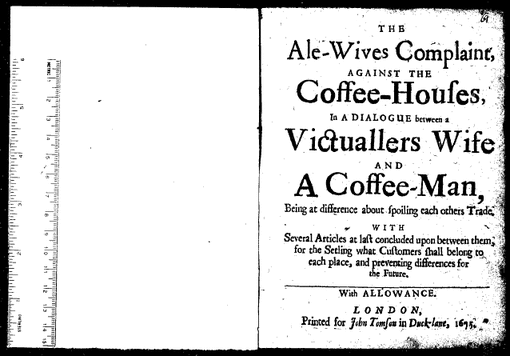 (1675) Wing / 1298:09 O Oh Ale-Wife! Oh, Coffee-Man! Can't we all get along? I promise, I'll divide my time among your fine establishments!
I'll be taking a short break from writing my blog for a while, well, to get some writing done. I'm about halfway finished my copy edits for A Murder at Rosamund's Gate. I'll also be working on the second draft of From the Charred Remains soon, gnashing my teeth over the feedback from my alpha reader. In the mean time, I'll leave you to contemplate how the ale-wife and coffee-man, long embroiled in cantankerous railing (stealing each others' customers!), came to enter a "friendly consultation." The ale-wife promised that "any person being reelingly drunk may be entertained in a coffee-house to make himself sober..." (Essentially, she promised to get her customers as drunk as possible and send them over to the Coffee-House, to improve the coffee man's coffee sales.) Similarly, the Coffee-Man agreed to send any of his customers who were tired of "superior speech" and "prittle prattle" over to the Ale-House. This way, they could get on with the business of "honest drinking." See, everyone wins! All this to say, if you need me, I'll be at the coffee house. Or at a tavern. Or on a seventeenth-century walkabout. (Okay, maybe grading papers. Maybe doing my day job.) Certainly writing. But I won't be on my blog. At least, not for a few weeks. Cheers!
4 Comments
 Yes, it's true! We've changed the title of my first novel to.... drum roll!!! drum roll!!! drum roll!!! A Murder at Rosamund's Gate My original title, Monster at the Gate, was deemed by the good people at Minotaur/St. Martin's to sound a little too harsh, a little too supernatural--and more importantly--a little too different in style from the type of book I had actually written.
I get that, actually. In one of my first blog posts, I talked about how the word "monster" was understood in seventeenth-century England, back when it didn't carry the supernatural "Frankenstein's Creature" connotation that it does today. But you know what? I love my new title. I think it captures the essence of my book better than the first title did. And hopefully, you'll see why, when my book comes out in early 2013. For now, you might imagine strolling through the beautiful garden pictured above. Birds, trees, seventeenth-century stonework...and oh no! a body... 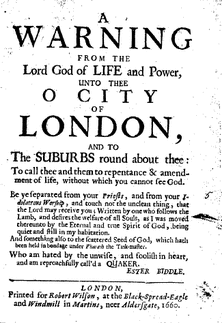 Esther Biddle, Quaker, 1660 This weekend I had the fun of seeing my first guest blog "Prophecy and Polemic— The Earliest Quaker Women" posted on the English Historical Fiction Authors website. There, I discuss why Quaker women were so political and how they differed in one particular way from most other women at the time--even members of other non-conformist sects (such as the Diggers, the Ranters, the Levelers etc). And oh! how they expressed themselves... Dressing in sack-cloth "Running naked as a sign" Refusing to bow to authority But that wasn't all... Quaker women were different because they wrote. And they wrote. And they wrote. And they wrote. In fact, as a group, Quaker women wrote 220 tracts before 1700, more than any other women. Petitions, broad-sides, chapbooks--all carrying admonitions to King, Parliament and clergy to recognize sinful acts, accounts of injustices and cruelties to their members, and pleas to release their religious brethren from prisons and authorize non-conformist worship in England, and the American colonies. I've always respected the bravery and creativity shown by the earliest Quakers, in their attempt to get their message heard. I've often thought how hard that must have been for them to write these open pieces. They were not just challenging Parliament, Magistrates, Churchmen and the King: they were challenging convention and the very heart of patriarchy, often risking public ridicule, shaming, abuses and imprisonment. Taking the mantles of Old Testament prophets, mid-seventeenth century Quaker women wrote openly about the social wrongs they perceived around them, especially those caused by the (imagined and real) abuses of men in power. In the soul-examining spirit of the time, Quaker women--like their male counterparts--also wrote publicly about their own struggles to find the "Inner Light" and to give up earthly fripperies. (Poor Susannah Whitrowe--she really wanted to cling to her ribbons, but knew she wasn't supposed to) They wrote about death and heartbreak, joy and promise. (This is not too suggest that they did not use their expressions of suffering to advance their cause--both politically and religiously--but there is an honesty to their expression that is admirable). At a time when women who wrote were disparaged as "petticoat authors," early Quaker women persevered to make their voices known. Just as they "ran naked as a sign" to convey their discontent to religious and secular authorities, they wrote nakedly too. They laid their emotions and concerns bare, for public consumption, expressing themselves in ways that were both daunting and inspiring. As I writer, I certainly struggle to lay my words bare on the page. Those little editorial voices are hard to muffle! I'm hoping, with time, to find my most authentic voice. How about you? 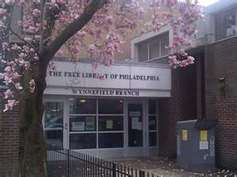 Wynnefield Library Anyone who knows me, knows I love libraries. If I have a few hours to myself, then I'll often find a library (or a coffee shop, these days) to read, write, think. And during my life, I've certainly had the opportunity to visit some beautiful and impressive libraries--Trinity College Library (Dublin), the British Library (London), the Oxford Library, the Biblioteque Nationale (Paris), the Newberry Library (Chicago), the Free Library of Philadelphia (main branch)...to name a few. And certainly, I live near some lovely libraries now in Highland Park and Lake Forest (Illinois). But for me, the most beautiful library in the world is the Wynnefield Library, a branch of the Free Library of Philadelphia, located just a few blocks from where I grew up in West Philly. It's not fancy, it's not glamorous--in fact, the modest 1960s exterior has a lot to be desired visually. A gently flowering tree gracing the red brick walls might look to be the library's only beauty. Certainly, no Baroque drama, no Georgian curves here, not even a whit of Victorian indulgence to be found. 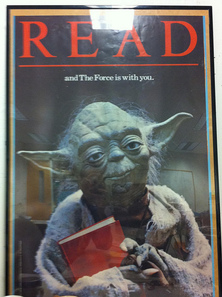 Posters like these urged kids to read The interior is equally simple. If I'm remembering correctly, a main circulation desk greets you when you enter, and just after, the young adult section. Beyond that lay the Adult Reading Room. (I only ventured in there looking for my mother, usually finding her in the mystery stacks. To this day, I'm fairly certain that the area would still feel off-limits to me). To the left, the children's area awaited. There, the children's librarians (especially dear Ms. Naismith) knew our names, often greeting us with recommendations and new readings to share. As an inner-city regional branch, I can only imagine now how limited the holdings must have been, how few the copies of popular books, and how few new books ever went into circulation. Yet, I can remember leaving most days with one, two, three, even up to the maximum twelve books we were allowed to check out on a given day. (Thank goodness it wasn't twelve books total, especially with my--ahem--terrible allergy to returning books on time! I'd never get anything new.) The books were much-handled, many were stained, but I don't remember ever minding their careworn pages. The library brought us together in ways I can scarcely make sense of now. The librarians didn't just read us stories; they helped us form book clubs, let us put on plays, and stimulated our curiosity in new worlds. I remembering saying to a librarian once I couldn't find any more good books. She promptly introduced me to Tamara, a girl who lived near me, but whom I'd never met. Tamara in turn introduced me to Louisa May Alcott. Without this introduction, I might never have discovered one of my all-time favorite authors, or found a new friend. Clearly, the librarians simply loved reading, just as we did, and shared that love of reading with us. We weren't just "patrons" to them (or worse, kids to be ignored). The librarians viewed us as what we were: individuals, thinkers, and above all else, readers. The Wynnefield Library may not have had much, but in its beautiful humble way, it sustained and nourished a community. What do you think? What's the most beautiful library? 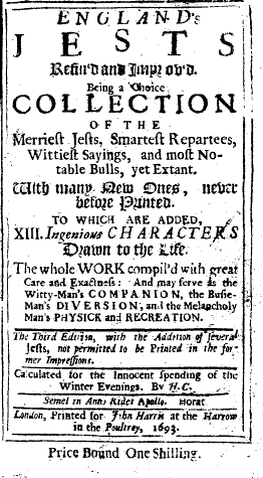 So if you're at that seventeenth-century dinner party that I mentioned in my last post, you'll want a few "merry jests, smart repartees, witty sayings, and a few notable bulls" to amuse and delight your friends (that is, if you want to transcend urine tricks and flatulence). (Not jokes though--apparently the word joque, from the Latin iocus "jest, sport, pastime'--had only just emerged in England in the 1660s, and was only just entering the seventeenth-century vernacular.) This particular jest-book, Humphrey Crouch's England's Jests Refin'd and Improved (1693), one of England's first such collections, offers equal opportunity digs at all manner of people: gentry, magistrates, royals, Quakers, Catholics, priests, Jews, foreigners, scholars, students, old people, young people, pregnant women, scolds, rakes, brothel-keepers, cuckolded husbands, criminals awaiting execution--you name it. Many jests were political or religious in nature but, as you might imagine, such humor doesn't always translate easily across three centuries (and English doesn't always translate to American. HA!) However, this one just amuses me. "A witty young fellow was try'd for his life, since his Majesties Restoration. And being caught, they told him he must be hang'd: But he pleaded in his own defence a long time; at last desir'd the Judge, That if he must be hang'd, he might be hanged after the new way that Oliver was, three or four years after he was dead." (The corpse of the Lord Protector Oliver Cromwell had been dug up and hanged posthumously two years after Charles II was restored to the English throne. Yup, as gross as it sounds.) And, I could skip the obligatory lawyer jest but I won't. "A certain person speaking unseemly words before a Gentlewoman, she ask'd him what profession he was of. Madam, says he, I am a civil lawyer. Alas, Sir, she replied, If Civil lawyers are such rude people, I wonder what other Lawyers are." Mwah ha ha! Civil lawyers. (Okay, fine. Maybe not that funny) Of course, I imagine bawdy humor will still translate best.... "Two friends meeting, one being overjoyed to see the other. Hark you Sir, said he, Between you and I, my wife's with child. Faith, cry'd the other, you're a liar, for I have not seen her this twelve months." (Awk-ward!) "A young woman, having married a great student, who was so intent on his studies, that she thought herself too little regarded by him, and one day when they were at Dinner with some Friends, she wished herself a book, that she may have more of her Husband's company. If it must be so, says her husband, I wish thou wert an Almanack, that I might change thee for a new one once a year." (Ouch!) 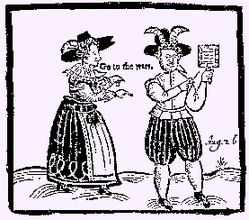 the witless cuckolded husband (with horns!) "One that had only been married but a week called her husband a 'cuckold,' which her mother hearing, reproved her: You slut, says she, do you call your husband cuckold already?And I have been married this twenty years to your father, and never darest tell him of it yet!" (Ah, the old cuckolded husband jest). So you tell me...how would this jest end? A cuckold, a magistrate, and a Puritan walk into a tavern... |
Susanna CalkinsHistorian. Mystery writer. Researcher. Teacher. Occasional blogger. Categories
All
Archives
May 2023
|
 RSS Feed
RSS Feed